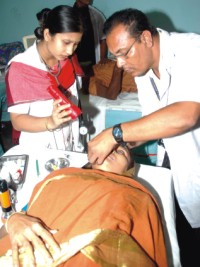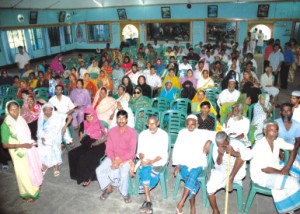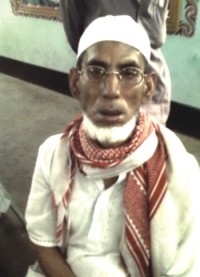|
Making a Difference
Seeing Is Believing
Syed Nadim Noah

Paramedics examining a patient |
The sun shone brightly on the paddy fields of a village in Narsingdi. Farmers were busy working on the paddy fields, while the women were doing their household chores. Goal! Everyone cheered at the shot of the ball swishing past the goalkeeper. Little Arif started clapping his hands fervently, shouting and dancing all at the same time. Looking at him from a distance, one cannot differentiate him from the others, but as you get closer you'll see the curse he has lived with, a curse that can be cured within a few minutes. Little Arif is blind due to cataracts in both of his eyes. Arif is the son of Akbar, a rickshaw puller. His parents have no idea that a small operation can fix their loving son's eyesight. However, even if they did, the money required for the surgery is something they just cannot afford. Thus, one can only imagine the immense joy felt by his parents, when they are informed that their son will get back his eyesight and there will be no costs involved. They rush to the hospital with Arif and make immediate arrangements for the surgery. Then the day finally arrives and Arif's bandage is opened. He squints his eyes, as he looks at the bright sun for the first time in his life. Unable to believe that he finally can see, he turns to his mother and asks “Mum who is the angel who fixed my eyes?” His mother with tears rolling down her cheek replies,” Son it's no angel, but a doctor.”
As part of its Corporate Social Responsibility (CSR) activities worldwide Standard Chartered Bank has undertaken a huge project to help people with blindness caused by cataract, regain their eyesight. The project is being carried out in almost 20 countries around the globe including Bangladesh. The project is mainly funded by the Bank with some funding and technical assistance from Sightsavers.
The launching ceremony of 'Seeing is Believing Phase IV: A new Vision (Dhaka Urban
 Waiting with hope... |
Comprehensive Eye Care Project) at the Islamia Eye Hospital auditorium took place on Tuesday October 14th, 2008. Md Anwarul Iqbal, Adviser, Ministry of local Government, Ahmed A Shah, acting CEO and Managing Director of Standard Chartered Bank, Mirza Ali Behrouze Ispahani, chairman of Islamia Eye Hospital, Dr. Md Showkat Ali, chief health officer of DCC and Dr. Wahidul Islam, Country Director of Sightsavers Int'l were some of the people that were present during the occasion. The project named as 'Seeing is Believing,' started back in 2003 by Standard Chartered Bank to mark their 150th Anniversary. It consists of four phases of which Phase I was launched and completed in 2003, Phase II from 2004-07, Phase III still continuing from 2006-10 and lastly Phase IV which is from 2008-2014. The main target of all the phases is to help poor people who are visually impaired to get back their eyesight free of cost. It started out small in Phase I, where the target was to fund 28,000 sight -- restoring cataract operations; the project,however, managed to raise enough money to fund 56,000 operations. Steadily the project grew and new phases comprising of greater targets were born. Thus, we come to Phase IV, the target of which is to provide sustainable eye care services to the poor and neglected urban communities in 20 key cities across the world. Around US$20 million is to be raised to fund this gargantuan project. The main partners of this great project are Sightsavers Int'l, International Agency for Prevention of Blindness (IAPB) and World Health Organisation (WHO). Dhaka was one of the key cities selected as a target for Phase IV. Across the world, one person goes blind every five seconds. Every minute, another child loses his/her sight. Sixty percent of children die within a year of going blind. There are 45 million blind people in the world and a total of 314 million people suffer from a serious form of visual impairment. In many cases, this has a serious effect on employment and education opportunities. Yet, a staggering 75% of blindness can be avoided with the right treatment. Ninety percent of avoidable blindness occurs in the developing countries like ours. Among the 12 million estimated population of Dhaka, 50,400 adults are affected

Abdul Khalek |
by cataract. 10,000 cases of adult cataracts occur each year. Most of the surgeries done, are on patients from the upper and middle class groups of the society. The poorer sections of society are left out of this health care; most of them are not even aware that any such treatment is available. This is where the project intervenes and will hopefully work for the a change in this bleak scenario. The part of the project of Phase IV which will be dealing with the condition in our country is called “Dhaka Comprehensive Eye Care Project.” The partner hospitals for this project are: Islamia Eye Hospital (IEH), Dhaka Bangladesh National Society for the Blind (BNSB), Ad-din and Salauddin Specialised Hospital Ltd. The aims of this project will not only deal with providing surgery for cataract infected eyes, but also various other eye related services, delivering community eye health education and awareness raising. Dr. AKM Selim Akond, a consultant of BNSB hospital has been examining patients at a camp since morning and says that he sees at least 300 patients everyday. At this time the patient's blood pressure, eye pressure, urine and other indicators are checked. The medical team consists of five paramedics and two doctors. After basic testing and examinations, those patients who require surgery will be taken to the respective hospitals where the operations will take place.
For most of these people, which includes many elderly people, the camp is nothing short of a Godsend.
Sitting at a corner is 65 year old Abdul Khalek who explained that he had come to the camp after hearing about an announcement on the mike in his area, he was also given a leaflet.
"Upon my arrival, I had been given a slip and was made to wait in the hall following a queue" says Khalek. "After about an hour, my turn came to see the doctor. They examined me, gave some medications and told me that I was going to have an eye operation today. I was then escorted downstairs and instructed that I would be taken to the hospital after sometime."
Khalek is very impressed with the way he has been treated.
"I never dreamt that such an operation, let alone a free one, was possible," he says. "Everyone has been very kind and caring towards me. Thanks to the people who made this come into existence. May Allah bless us all."
Copyright (R) thedailystar.net 2008 |
